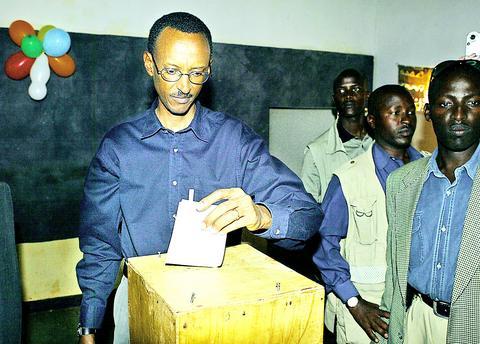Rwandans voted yesterday in their first election since a 1994 genocide in which hundreds of thousands were killed, with the incumbent Paul Kagame widely expected to beat two rivals to remain president.
As a red sun rose in the sky, voters formed queues to cast their ballots at polling stations around the hills and valleys of the small central African country of 8 million.
"It's very important to vote," said Jean Bosco Ndizeye, a university student. "We want democracy. This is part of democracy and human rights. We can vote for the one we want."

PHOTO: AFP
Two other candidates are standing in the presidential poll that will show how far Rwanda's wounds have been healed after the genocide and how democratic the African state has become.
Not everyone was so confident of a fair vote.
"We are not free to campaign for some of our candidates," bicycle taxi driver Claude Hitimana said after casting his ballot.
"Let me hope the ballot boxes are not stuffed already."
Polls opened at 6am and were to close at 3pm.
Around 1,900 election observers, including 350 foreigners, will monitor the election. There are 3.9 million registered voters in Rwanda, and more than 10,000 members of the diaspora are expected to vote at embassies around the world.
In a society where illiteracy is rife, voters are required to place a thumbprint against the photograph and name of their preferred candidate on a ballot paper.
A Tutsi, Kagame has dominated politics in mostly Hutu Rwanda since seizing the capital Kigali at the head of a rebel army in 1994, ending the genocide -- climax of decades of bloodshed built on a tribal divide that colonialists cemented.
He has boosted security, reduced poverty, kick-started economic growth and promoted ethnic reconciliation. But critics say his government has an iron grip on Rwanda and question how democratic the election will be.
In 1994, Hutu extremists killed an estimated 800,000 minority Tutsis and Hutus who did not share their "Hutu-power" ideology. Hutus comprise 85 percent of Rwanda's 8.2 million population, Tutsis 14 percent and the rest are Twa pygmies.
The two candidates standing against Kagame are both moderate Hutus and are running as independents while the president has party backing from his Rwandan Patriotic Front. A fourth candidate withdrew on Sunday.
The election is the first time more than one candidate has stood for president in Rwanda, which won independence from Belgium in 1962.
Kagame has appealed to people to vote as Rwandans, not as Hutus, Tutsis or Twa, in the poll marking the end of a nine-year transitional period which began after the genocide.

Drug lord Jose Adolfo Macias Villamar, alias “Fito,” was Ecuador’s most-wanted fugitive before his arrest on Wednesday, more than a year after he escaped prison from where he commanded the country’s leading criminal gang. The former taxi driver turned crime boss became the prime target of law enforcement early last year after escaping from a prison in the southwestern port of Guayaquil. Ecuadoran President Daniel Noboa’s government released “wanted” posters with images of his face and offered US$1 million for information leading to his capture. In a country plagued by crime, members of Fito’s gang, Los Choneros, have responded with violence, using car

The team behind the long-awaited Vera Rubin Observatory in Chile yesterday published their first images, revealing breathtaking views of star-forming regions as well as distant galaxies. More than two decades in the making, the giant US-funded telescope sits perched at the summit of Cerro Pachon in central Chile, where dark skies and dry air provide ideal conditions for observing the cosmos. One of the debut images is a composite of 678 exposures taken over just seven hours, capturing the Trifid Nebula and the Lagoon Nebula — both several thousand light-years from Earth — glowing in vivid pinks against orange-red backdrops. The new image

CYBERCRIME, TRAFFICKING: A ‘pattern of state failures’ allowed the billion-dollar industry to flourish, including failures to investigate human rights abuses, it said Human rights group Amnesty International yesterday accused Cambodia’s government of “deliberately ignoring” abuses by cybercrime gangs that have trafficked people from across the world, including children, into slavery at brutal scam compounds. The London-based group said in a report that it had identified 53 scam centers and dozens more suspected sites across the country, including in the Southeast Asian nation’s capital, Phnom Penh. The prison-like compounds were ringed by high fences with razor wire, guarded by armed men and staffed by trafficking victims forced to defraud people across the globe, with those inside subjected to punishments including shocks from electric batons, confinement

Canada and the EU on Monday signed a defense and security pact as the transatlantic partners seek to better confront Russia, with worries over Washington’s reliability under US President Donald Trump. The deal was announced after a summit in Brussels between Canadian Prime Minister Mark Carney and European Commission President Ursula von der Leyen and European Council President Antonio Costa. “While NATO remains the cornerstone of our collective defense, this partnership will allow us to strengthen our preparedness ... to invest more and to invest smarter,” Costa told a news conference. “It opens new opportunities for companies on both sides of the